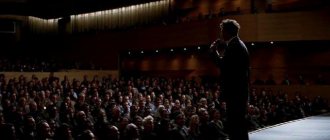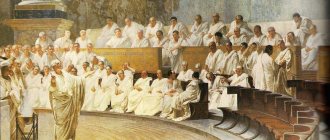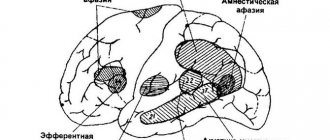The concept of legal rhetoric
Definition 1
Legal rhetoric is a set of skills and abilities of a lawyer in preparing and delivering a judicial speech, conducting conversations, advising clients, and participating in negotiations. Legal rhetoric is understood as methods of persuasion, various forms of linguistic influence on the audience to obtain the desired effect.
Rhetoric, or oratory, is a philological science about the art of public speaking in front of an audience, studying ways of constructing artistically expressive speech. A good speaker is distinguished by accuracy, clarity, purity of speech and extremely informative language. The practice of communication determines the subject of rhetoric as a theory of communicative activity.
Are you an expert in this subject area? We invite you to become the author of the Directory Working Conditions
The most well-studied and vibrant side of legal rhetoric is the analysis of texts of lawyer’s speeches and judge’s decisions. A large part of the subject of legal rhetoric is the process of preparing arguments, grounds, conclusions, and formalizing the characteristics of the content of the case for subsequent presentation in a lawyer’s speech or a court decision.
Legal rhetoric is closely interconnected with various branches of law and philology, and is an important applied section of scientific rhetoric. Legal rhetoric depends on the methodology and subject matter of the systematic discipline. Conviction is the subject of legal rhetoric in emerging legal relations.
As a scientific discipline, legal rhetoric explores the entire scope of problems associated with the preparation and provision of evaluative conclusions about legally significant facts in the process of their research and legal decision-making. Specific legal and philological approaches to the study of legal rhetoric are legitimate if they are consistent with the rhetorical method of research. The scientific methodology of legal rhetoric is closely related to the methodology of law and the general methodology of the humanities.
Finished works on a similar topic
Coursework Legal rhetoric 450 ₽ Essay Legal rhetoric 280 ₽ Test paper Legal rhetoric 200 ₽
Receive completed work or specialist advice on your educational project Find out the cost
Judicial speech and its types
Definition 2
A judicial speech is a public speech addressed to all those present during the consideration of a civil or criminal case and participating in it, delivered in the courthouse and representing a statement of the lawyer’s conclusions in this case or his objections to other speakers.
The main purpose of judicial speech is to help persuade judges, to influence lay judges and jurors, as well as citizens present in the courtroom, in a reasoned and convincing manner. Judicial speech forms a “bridge” between the speaker’s understanding of the truth of the case and the upcoming court decision.
Types of judicial speeches:
- by purpose - speech in a civil or criminal case;
- for subjects of public speeches - speech of the state or public prosecutor, public defender, defense attorney, civil plaintiff and defendant, defensive speech of the defendant;
- by stages of legal proceedings - in criminal proceedings, speech is distinguished: at the stage of transferring the suspect to the court, at the trial, at the stage of execution of the sentence, at the trial, at the supervisory authority.
The subject of judicial speech is the act for which the defendant is held accountable. The material for judicial speech are circumstances related to a civil or criminal case, evidence and facts.
1. The concept of judicial eloquenceThe prosecutor and lawyer speaking in court arguments are called judicial speakers.
This comes with a lot of responsibility. Why? To answer this question, let's remember who the speaker is. Orator
The word orator was borrowed in the 18th century. from the Latin language (Latin orator - from orare - to speak, expound). The word has multiple meanings. Its first meaning is “one who makes a speech,” “a person who makes a speech.” In this meaning, the word is used as a term: the prosecutor and lawyer, defending or challenging the rights of the plaintiff and defendant in civil proceedings and supporting the state prosecution or defending the rights of the defendant in criminal proceedings, perform their function in accordance with the procedural provisions in court proceedings. The role of the speaker in this understanding of the word comes down to performing actions provided for by procedural law: analyze, give a legal assessment.
We will not be mistaken if we say that most often a person who makes a public speech on duty, formally, without love for the work, without respect for his profession, speaks, as a rule, indistinctly, uncertainly, monotonously, confusingly, with memorized standard phrases, with speech mistakes. His speech is clogged with empty, unnecessary words such as, in general, as if
etc. There is no need to talk about oratorical techniques. Listening to such speech is boring. And is it needed in court? Does it serve its purpose? And the speaker doesn’t even think that the speech can be delivered differently, so that it becomes convincing, so that the judge listens to it.
Just recently I had to listen to the speech of a young lawyer who, within a few minutes, uttered the colloquial form of the remedy three times.
And when, after the end of the process, I explained to him his mistake, he reacted laughing: “Oh, yes, this happens to me. You know, oratory is not in demand now.”
Is it shameful to speak clearly, competently, beautifully? Unfashionable?
You can evaluate the speaker as a good or bad speaker, skillful or inept, boring. But it is important to remember that “Poor-quality, unconvincing judicial speech affects not only the interests of justice, the victim and the defendant, but also the reputation and image of the judicial speaker, especially the lawyer” [143. P. 279].
But the word orator has a second meaning: “one who has the gift of speaking, eloquence.”
This is not only a speaking person, but a person who knows how to speak in front of an audience. He knows how to grab the listeners' attention because he is a master; he has the art of oratory; he loves his job. A speaker is a person who has deeply studied the topic of the speech, the materials of the case and is fluent in them; a person who can clearly and definitely formulate the thesis of a speech and draw up a work plan; a person who presents material logically, clearly, and convincingly. “An orator is one,” wrote Cicero, “who will present any question with knowledge of the matter, harmoniously and gracefully, with dignity in execution.” Such speakers were prominent jurists of the past. V.M. spoke about them with great respect. Savitsky: “Think about it, why do we pronounce the names of old Russian lawyers with reverence? Why do we often remember them? (From a conversation at a round table in the editorial office of the Nedelya newspaper). Oratory
What is oratory? The word “art” means “a branch of creative artistic activity” (emphasis added - N.I.);
“a high degree of skill and mastery in any field of activity.” A specific area of activity is oratory. This is the creative activity of preparing and delivering a public speech. An activity based on a lot of hard work, as a result of which a person can master the ability to deliver a speech in front of an audience: speak logically, intelligibly, engagingly and convincingly. In the theory of public speech, oratory is understood as a complex of knowledge and skills of a speaker in preparing and delivering a public speech: this is the ability to formulate a thesis and select material, the art of constructing a speech and public speaking in order to have a certain impact on listeners; this is the ability to prove and disprove, the ability to convince; This is verbal skill.
One of the types of oratory is judicial oratory, which is often called judicial eloquence. What is eloquence?
M.V. Lomonosov wrote that “eloquence is the art of speaking eloquently about any given matter.” But can a prosecutor supporting a murder charge speak “red”? Is beautiful, figurative speech appropriate when presenting the results of a forensic medical examination? or, for example, with the legal qualification of a crime? when determining the punishment for the defendant?
MM. Speransky defined eloquence as “the gift of shaking souls.” But how can a judicial orator shake souls?
A.F. Kony distinguished between the concepts of “eloquence” and “oratory”. He understood eloquence as “the gift of speech, exciting and captivating listeners with the beauty of form, the brightness of images and the power of apt expressions,” i.e. as the ability to speak figuratively, as a natural talent. Oratory, in his opinion, “is the ability to speak competently and convincingly.”
The word eloquence
IN AND.
Dahl defined it as science “and the ability to speak and write eloquently, convincingly (emphasis added - N.I.)
and captivatingly.”
Modern dictionaries interpret it as follows: “1. The ability, the ability to speak beautifully, convincingly (emphasis added. - N.I.);
oratorical talent || Skillful speech, built on oratorical techniques; oratory. 2. The science that studies public speaking; rhetoric".
This means that eloquence is the ability to speak not only beautifully, but also convincingly; it is a combination of talent and certain knowledge and skills.
Judicial eloquence, the main purpose of which is to facilitate the establishment of legal truth in a case and the formation of the internal conviction of judges, has its own specifics, which are determined by the norms of procedural law and presuppose the evaluative and legal nature of speech[3]. This specificity was characterized by N.P. Karabchevsky: “Judicial eloquence is a special kind of eloquence. It cannot be looked at only from an aesthetic point of view. All the activities of a judicial speaker are combat activities. This is an eternal tournament in front of the exalted and unattainable “lady with a blindfold.” She hears and counts the blows that opponents inflict on each other, and guesses with what weapon they are inflicted" [96. S. VI]. Each speaker has his own speech tactics, style, oratorical techniques and speech means, tested and practiced. Some conquer the judicial audience with the power of their inspiration, like F.N. Plevako, others - with depth of thought and clarity of presentation, like A.F. Horses. But it is important for every judicial speaker to be able to speak clearly, competently, and with reason. This is the main thing.
Take for example the texts of court speeches by famous pre-revolutionary lawyers K.K. Arsenyeva, M.F. Gromnitsky, - their language is dry, businesslike. You will not find vivid expressions or memorable images in them. But the speeches are deep in content, reasoned and convincing, and the conclusions are justified. Thoughts are presented accurately, clearly and logically. Therefore, they are rightly considered examples of judicial oratory.
In our opinion, judicial oratory
can be defined as a lawyer’s complex of knowledge and skills in preparing and delivering a public judicial speech in accordance with the requirements of the law;
as the ability to construct objectively reasoned reasoning that forms scientific and legal beliefs; as the ability to influence
people's legal consciousness.
Judicial oratory is associated with the requirement of logic and persuasiveness. Evidence is the most important feature of reasoning in legal proceedings. All provisions in a speech must be justified and reasoned.
“Find out, prove and convince - these are three interrelated functions that determine the internal content of judicial eloquence,” noted one of the researchers of judicial speech[4].
The art of a judicial speaker is manifested in the ability to clearly define the topic of the dispute (thesis, target setting), to construct a judicial speech in such a way as to attract the attention of judges and keep it throughout the entire speech, in the ability to fully and objectively analyze the circumstances of the case, indicate the causes of a crime or civil conflict, give a deep psychological analysis of the personality of the defendant and the victim, build a system of refutations and evidence, draw the correct legal conclusions and convince judges and the audience of this. It also manifests itself in the ability to exert a psychological impact, in the ability to find precise linguistic means for expressing thoughts, since a meaningful, valuable thought needs a perfect form. The perfection of speech creates an atmosphere of trust in the speaker in the court audience.
To speak well in court is to speak to the point, carefully, comprehensively and objectively analyzing the materials of the case, based on the rules of law; speak intelligibly, logically, convincingly, in accordance with the norms of the literary language.
Eloquence as “the ability to speak beautifully” is an integral part of judicial oratory - an effective means of emotional influence. Fine and expressive means of language help the judicial speaker to focus the attention of the court on certain details of the case.
By revealing the picture of the crime, assessing the consequences of the crime or the illegality of the transaction, creating a psychological characteristic of the defendant, the judicial speaker thereby “shocks the souls” of the listeners. Of course, correctly chosen linguistic means and oratorical techniques contribute to this. “Judicial speeches only contribute to the court making a correct and fair decision based on the results of the trial, when the positions of the prosecution and defense are presented quite clearly and convincingly, according to all the rules of oratory” [172. P. 141].
Requirements for the language of judicial speech undergo changes in certain eras. If in pre-revolutionary Russia court speakers, as a rule, did not use speech legal standards, and many lawyers spoke to jurors, “as writers speak to the public,” then in the Soviet period it was believed that “all sorts of excesses with the goal of embellishment of speech for the sake of its appearance effect, can only harm the cause and hinder the achievement of the goal" [52. P. 15]. It was recommended to speak in the language of the law. The speech of court speakers has become clichéd and standardized. Currently, in accordance with judicial reforms, there is a need for a bright, imaginative court agreement. Nowadays, the idea once expressed by N.P. Karabchevsky is becoming relevant: “The outer side of speech requires artistic integrity and expedient completeness” [95. P. 89].
This idea has become especially relevant these days, when monotonous, stereotyped, boring, and not always convincing speeches are made every day in judicial debates. Modern lawyers raise the question of returning to the court “real judicial oratory, in which there is both reasonable content and an attractive, elegant form, when useful content is presented not only convincingly, but also arouses admiration” [130. P. 49.]
The skill of a judicial speaker is based on constant hard, focused work. Only frequent practice and the desire to achieve mastery will lead to the ability to speak in public. In the art of judicial negotiation, to be able to speak means to be fluent in all the materials of the case, all the evidence, to feel the form of one’s speech, to understand its meaning.
, know the secrets of the speaker's profession. A clear, clear, impeccably reasoned presentation of one’s position is an important sign of a culture of public speaking.
To acquire the skills to become a good judicial speaker, you need to remember that preparing a judicial speech is a creative endeavor. To do this, it is necessary to master the logic of reasoning and presentation, methods of persuasion, oratorical techniques, methods of preparing and delivering a convincing, influential speech. Rhetoric teaches all this
, which is defined as the science of the conditions and forms of effective speech communication, the diverse ways of persuading an audience through speech influence.
Notes:
3
For more information, see “The purpose of judicial speech” and “Distinctive features of judicial speech” in topic 2.
4
Mikhailov M.M. Stylistics of Russian speech. Cheboksary, 1968. P. 198.
Table of contents






